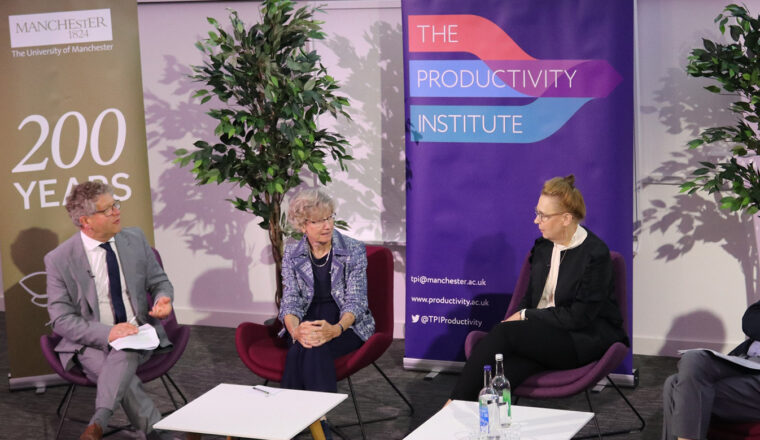Long-term perspectives and large-scale investments
The Productivity Institute and the Bennett Institute for Public Policy’s Diane Coyle recently gave oral evidence to the House of Commons Treasury Committee scrutinising the 2023 Budget and its impact on households and businesses across the UK, and on inflation, taxation and economic growth. The following blog is Diane’s reflection on the session.
In March, I took part in an evidence session of the Treasury Committee reviewing the recent Budget announcements, along with Torsten Bell, Paul Johnson and Tony Wilson. The main points I wanted to highlight to the committee members were three policy requirements to help improve productivity growth: the need for long-term perspectives, a place-based approach, and much greater investment in infrastructure.
Long-term perspectives
The UK economy suffers from constant changes in strategy – this is problematic for productivity. Consistency and coordination are needed to achieve long-term growth, and we require a long-term strategic approach to managing the economy. Yet – to pick up on one of the Budget announcements – we have had at least 18 changes in capital allowances since 1984 (when then-Chancellor Nigel Lawson significantly reduced them). In other words, some aspect of the allowances system has changed every other year. When businesses are being asked to make very long-term investments, this is clearly not good for planning. If you look back to the early 1990s recession, all of the G7 countries saw a big drop in business investment. In the other countries it recovered, but not in the UK, and we have been at the bottom of that league table ever since.
While tax will make a difference, surveys of employers also consistently highlight poor infrastructure and lack of skills as barriers to further investment. At the committee session, I said that the new innovation zones are an interesting idea, but they are too small in scale. With a five-year horizon, broken down for each zone year-by-year, the investment amounts to just over £4 million in capital expenditure. Over a five-year period, you might perhaps build a small lab for that amount of money, but it is not going to transform anything.
Improving our productivity growth through industrial strategy is therefore partly about coordination, but it is also partly about scale, and it is absolutely about consistency.
“We will not fix these problems by fiddling with bits of the tax system. The UK must think about all the other pieces of the jigsaw puzzle that make up a high-performing economy.”
This signifies the paradoxical position in which the UK finds itself. There has been too much change in the past, but we probably need to change something now to improve our growth trajectory. While there is no single big bet that we can make to ensure future prosperity, one aspect that should be a focus area is infrastructure.
I have long been an advocate for the idea that we are not going to get faster national growth if the economy is only flying on the London and south-east engine. Nobody is arguing for less growth there, but it is not a negative-sum game or a zero-sum game; other parts of the country can and must grow as well. Why have we not upgraded northern rail when the potential productivity boost through the travel-to-work area and career possibilities for two-career couples in those northern English cities seems quite obvious? Why have we not upgraded transport infrastructure in South Wales when it is so needed?
I argued that the Treasury’s way of looking at those investments project-by-project can be damaging. The government needs to think about the strategic framework in which those projects sit. It is not about asking “Does this single railway line deliver the return needed for the individual investment?” but, “What else will we put around that? Can we make sure the bus routes join up to the stations? Can we make sure that the housing, or the laboratories, can get built?” It is that kind of co-ordination that we need, which may be difficult in the centre, but is much easier at the local level. That is part of the case for devolving more powers. Business investment should go hand-in-hand with improved powers locally, because local knowledge that is not available centrally will help enable sustainable growth around the country.
Research and development (R&D)
R&D is yet another area in which we have seen a great deal of policy churn, and science and innovation policy faces significant challenges in the current economic climate, as I noted on the Productivity Puzzles podcast with Richard Jones. An earlier government commitment to £22 billion of spend on R&D was welcome, but it is important to keep in mind that research-intensive companies are likely to continue investing in R&D, regardless of policy. The bigger challenge is in helping these companies to scale-up past their early stages. For example the Furman Review on digital companies highlighted that the only exit for many founders is to sell out to a bigger company. Thus, there is a need to address the scale-up and skills issues, as well as the infrastructure, to enable such companies to grow and thrive beyond their initial stages.
The other main issue raised by companies in research-intensive sectors is the lack of appropriate skills. It is not so much a lack of people with PhDs, or a lack of brilliant ideas; it is a dearth in mid-level technical skills, like lab technicians. This raises questions about further education, apprenticeships and pathways, which are being analysed extensively through research at The Productivity Institute. These are granular skills that can vary from sector to sector. For instance, the Cambridge area is a life sciences and information technology cluster, but another part of the country, like Manchester, might offer expertise in advanced materials and manufacturing – these require different skills provision and that is where the local knowledge comes in.
Public investment in basic research, analysing the process by which that research is spun out into innovative firms, and looking at how smaller companies scale up into bigger companies are all part of the story of how we become a frontier, research-intensive country. We will not fix these problems by fiddling with bits of the tax system. The UK must think about all the other pieces of the jigsaw puzzle that make up a high-performing economy.
It is well known that living standards over the long term depend on how productive firms are. This links a number of the issues I covered in the Committee evidence session: Can firms create jobs that pay people good wages? Do they invest? Do they have capital equipment? Can they get the skills they need? Can they get access to market? Over the past decade, the dispersion of productivity has increased significantly. Some firms are very productive and they are pulling further ahead of the rest, with firms operating outside the South East and London more often falling into the low productivity part of the distribution. The solution is not straightforward, requiring a combination of access to mid-level technical skills, access to apprenticeships, and the means of learning about using new technologies. Smaller companies, in particular, may face significant challenges in adopting new technologies to increase their productivity.
There is no quick fix, but if we want to see incomes rising across the country, as well as across the income distribution, we will require long-term perspectives, large-scale investments, coordination and consistency in policy, and greater devolved decision-making to take advantage of local knowledge.




